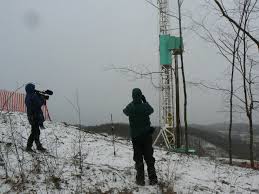Letter to the Western Livestock Journal
RE: Marcellus Shale Gas Development, Horizontal Drilling and Hydraulic Fracking in WV
Experience here in the Marcellus and elsewhere shows property damage to private individuals and to public property is a major issue with shale drilling, often called fracking. Well pads require 3 to 5 acres which are essentially removed from biological production forever. Pits large enough to park 40 tanker trucks are dug for fracking solutions.
Working areas are graded to subsoil and loaded with 12 to 18 inches of crushed stone to carry heavy trucks in all weather. Add pipelines which remove land from production for one hundred years, land for roads to well pads, damage due to drainage from platforms, and various factory like structures across the country side to remove liquids, pump the gas down the pipeline and serve other uses.
The surface is never paid for. The leases assume the right to take gas and liquids out for free. Only the gas is paid for, sometimes not even the liquids which are very valuable. If you own enough land this can be neglected, is neglected, for the royalty. If you do not own the minerals, it is worse than a natural disaster. The smaller your holding the worse a well pad damages your interest. Full development of a field will require about one pad and attendant facilities per square mile, plus large pipelines to carry the product to market.
Pits that are dug to accommodate waste frequently contaminate land, spills are frequent, and casing often lacks integrity so water is contaminated. Huge amounts of water are taken from God-knows-where and pumped underground and returns contaminated in such a way as to cause huge disposal problems for the driller and the public.
There is no regard for public health, convenience, wildlife, alternate uses, or pleasing appearance of the countryside. Taxes pay for use and destruction of roads, extra cost for courthouse record rooms and the inevitable additional law enforcement required. In our experience, trucks hauling water often move on public roads without license or inspection, with drivers working up to 20 hours a day. Accidents with them seem routine in our hills. Roads are sometimes obstructed up to a day at a time.
Shale wells are known to decline rapidly. Two thirds of total production may be removed in two years. Recovery of the available gas is usually less than 10%, perhaps the lowest in the petroleum industry. It now appears that much of the gas will be exported, rather than used in the United States. Historically, the development will be over in two or three decades, but the damage will last centuries, essentially forever.
Although observers are unwelcomed by drillers, landowners can provide access and point to most important observations. WVHostFarms.org can provide access, tours and free accommodation for individuals and small groups. Hundreds of pictures are available at Marcellus-shale.us. There are now more than 200 sites on the web trying to limit or stop shale drilling all over the nation and in many foreign countries.
S. Thomas Bond, 1779 Jesse Run Road, Jane Lew, WV 26378
Phone: (304) 884-7352, Email: stombond@lhfwv.com
Tom Bond is a retired chemistry teacher. He lives on and maintains a 500 acre farm near Jane Lew (Lewis County, WV) producing Red Angus Certified feeder calves.


{ 1 comment… read it below or add one }
This is what DOMESTIC TERRORISM looks like ….. brought to our neighborhoods by the “gas fracking corporations”.
Crimes of epic proportions!